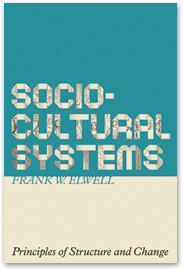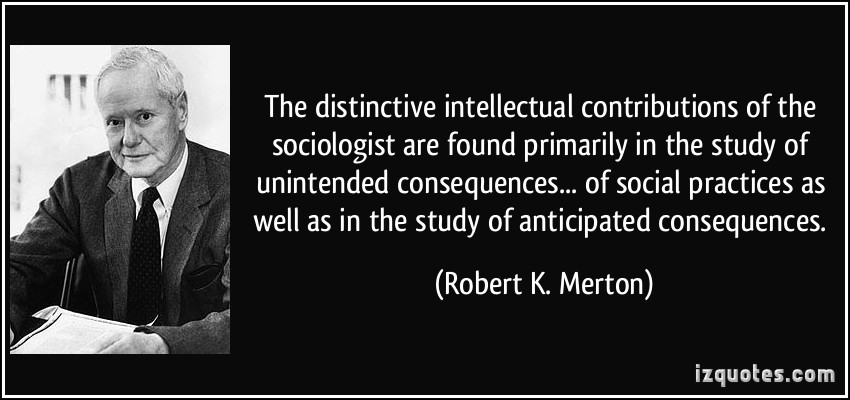
Sociocultural Systems: Principles of Structure and Change Macrosociology: Four Modern Theorists A Commentary on Malthus" 1798 Essay as Social Theory Great Classical Social Theorists In the Classical Tradition: Modern Social Theorists Dr. Elwell's Professional Page
|
rbert Spencer's Evolutionary
Sociology Robert K. Merton [1910-2003] | |
|
Merton on Structural
Functionalism
By Frank W. Elwell
Robert King Merton (1910-2003) is a self-styled “Durkheimian,” writing
very much in the functional tradition. In conceiving of society as a
system it becomes natural to see it, like other systems, as composed of
parts that are interrelated and whose operations have consequences on
the whole. For example, when examining a simple system like the human
body it becomes readily apparent that the various organs are
interrelated and impact the overall health of the body. So is it with
sociocultural systems. Functional analysis is a consequence of thinking
of society as a total system. Functionalism is the analysis of social
phenomena in terms of their effect on other phenomena and on the
sociocultural system as a whole.
The functional orientation has long been implicit in biology and
physiology, as well as in the social sciences of anthropology,
economics, and sociology. Social scientists as diverse as Malthus,
Spencer, Marx, Durkheim, and Weber have each engaged in describing the
interrelationships between social phenomena. To take a famous example,
Weber wrote of the effect that a religious belief, what he called the
“Protestant Ethic,” had on the rise of capitalism. In a more explicit
functional reference, Durkheim wrote of the “functions” of criminal
punishment in terms of its impact upon criminal behavior as well as its
effect on society as a whole (it serves to bind society together, making
explicit the rules as well as building consensus around these rules).
Robert K. Merton’s signal contribution to functionalism lies in his
clarification and codification of functional analysis. Specifically,
Merton:
One assumption of traditional functionalism is that all
widespread activities or items are functional for the entire system.
Functional unity, Merton stated, cannot be assumed; at most it is an
empirical question to be determined by social research. Further, it is
possible for some social or cultural items to have functions for some
groups within a social system and not for others. Instead, Merton
offered a “provisional assumption” that widespread and persisting
sociocultural forms have a “net balance” of positive over negative
consequences.
A second assumption of traditional functionalism is that all such
prevalent activities and cultural elements have sociological functions
and are therefore necessary for the maintenance of that system.
Sociocultural systems may well have functional needs or prerequisites,
Merton asserted, but these needs may be met by a diversity of forms.
Calling it a “major theorem of functional analysis,” Merton asserted
that “just as the same item may have multiple functions, so may the
same function be diversely fulfilled by alternative items” (Merton
1948/1968, 87–88).
One of the charges hurled against functional analysis in the 1940s and
1950s, and still echoed today, is that functionalism is an inherently
conservative perspective devoted to preserving the status quo. Merton
suggested that this charge is due to the fact that analysts, chiefly in
anthropology, have adopted these postulates that are untenable and
unnecessary to the functional orientation. To offset the focus on
stability of traditional functionalism, Merton introduced the concept of
“dysfunction.” Whereas functions contribute to the adjustment of the
system, dysfunctions are those consequences that lead to instability and
ultimately change. The analyst must recognize, Merton asserted, that
institutional structures and cultural elements are interrelated and
mutually supporting, and that the dominant orientation of sociocultural
systems is to stability. “As we survey the course of history, it seems
reasonably clear that all major social structures have in due course
been cumulatively modified or abruptly terminated. In either event, they
have not been eternally fixed and unyielding to change” (Merton
1948/1968, 95).
Merton insisted that social structures can only be analyzed in terms of
both statics (stability) and dynamics (change). The concept of
dysfunction allows functional theory to focus on change. The concept of
dysfunction is based on tension, strain, or contradictions within
component elements of sociocultural systems. Dysfunctional elements
create pressures for change within the system (Merton 1948/1968, 176).
Social mechanisms within the system, including the interrelation and
predominantly mutually supporting elements of the system, operate to
keep these strains in check, attempting to limit or minimize change of
the social structure. However, such mechanisms are not always effective,
and the accumulation of stress and resulting conflict often cause
systemic change. One of the primary goals of functional analysis is to
identify these dysfunctions and examine how they are contained or
reduced in the sociocultural system as well as how they sometimes cause
systemic or fundamental change. Merton, 1948/1968, p. 107.
“Functions are those observed consequences which make for the adaptation
or adjustment of a given system; and dysfunctions, those observed
consequences which lessen adaptation or adjustment of the system.”
Motive, on the other hand, is the subjective orientation of the actor
engaged in the behavior (Merton 1948/1968, 105). The failure to
distinguish between functions and motives is one of the chief sources of
confusion for students of functionalism. The observer Merton is
implicitly referring to is the social scientist.
The descriptive protocol recommended by Merton consists of four
postulates. First, the analyst should make a systematic account of the
pattern of behavior of interest as well as the people participating in
the behavior. This account should include a detailed description of the
social status of participants and onlookers as well as the types and
rates of their interactions. Merton, always concerned with the
relationships between theory and methods, attempted to summarize the
types of data needed to be collected to perform functional analysis.
What types of data need to be included in observations, and what types
of data can be safely excluded? These descriptions, Merton claimed, go a
long way toward suggesting functional interpretations. Merton,
1948/1968, p. 110.
The second item of the descriptive protocol calls for the analyst to
explore other possible patterns, perhaps those of other sociocultural
systems that represent alternative ways of dealing with the problem
under study. For example, Merton pointed out that the “romantic love
complex” as the basis for American
The third item in the protocol is to describe the various meanings that
the pattern of behavior has for the various participants and members of
the group. Such meanings often give the analyst clues as to the social
functions of these sociocultural items. Such meanings often give the
analyst clues as to the social functions of these sociocultural items
(Merton, 1948/1968, pp. 111–112).
The fourth protocol is for the analyst to give account of the
motivations of the people who both conform or deviate from the pattern
under study. Again, these personal motives should not be confused with
social functions, but they do serve a purpose in functional analysis.
“Inclusion of motives in the descriptive account helps explain the
psychological functions subserved by the pattern and often proves
suggestive with respect to the social functions” (Merton 1948/1968,
113). “Inclusion of motives in the descriptive account helps explain the
psychological functions subserved by the pattern and often proves
suggestive with respect to the social functions” (Merton 1948/1968,
113).
Merton’s final contributions to sociology are his many theories and
insights to understanding sociocultural systems and human behavior.
These include:
»
Anomie theory (Strain theory).
»
Bureaucratic Personality
»
Sociology of science
»
Middle range theory
»
Focus groups For a more extensive discussion of Merton's theories refer to Macro Social Theory by Frank W. Elwell. Also see Sociocultural Systems: Principles of Structure and Change to learn how his insights contribute to a more complete understanding of modern societies.
Bibliography:
Elwell, F. W. 2009. Macrosociology: The Study of Sociocultural
Systems. Lewiston: Edwin Mellen Press.
Elwell, F. W. 2006. Macrosociology: Four Modern Theorists.
Boulder: Paradigm Publishers.
Elwell, F. W. 2013. Sociocultural Systems: Principles of Structure and
Change. Alberta: Athabasca University Press.
Merton, R. K. (1994/1996). A Life of Learning. In R. K. Merton, & P.
Sztompka (Ed.), On Social Structure and Science (pp. 339-359).
Chicago: The University of Chicago Press.
Merton, R. K. (1996). On Social Structure and Science. (P.
Sztompka, Ed.) Chicago: The University of Chicago Press.
Merton, R. K. (1948/1968). Social Theory and Social Structure.
New York: The Free Press.
To reference
Merton on Functional Analysis you should use the following format:
Elwell, Frank
W., 2013, "Merton on Functional Analysis," Retrieved August 31, 2013,
[use actual date]
http://www.faculty.rsu.edu/~felwell/Theorists/Essays/Merton1.htm
|



